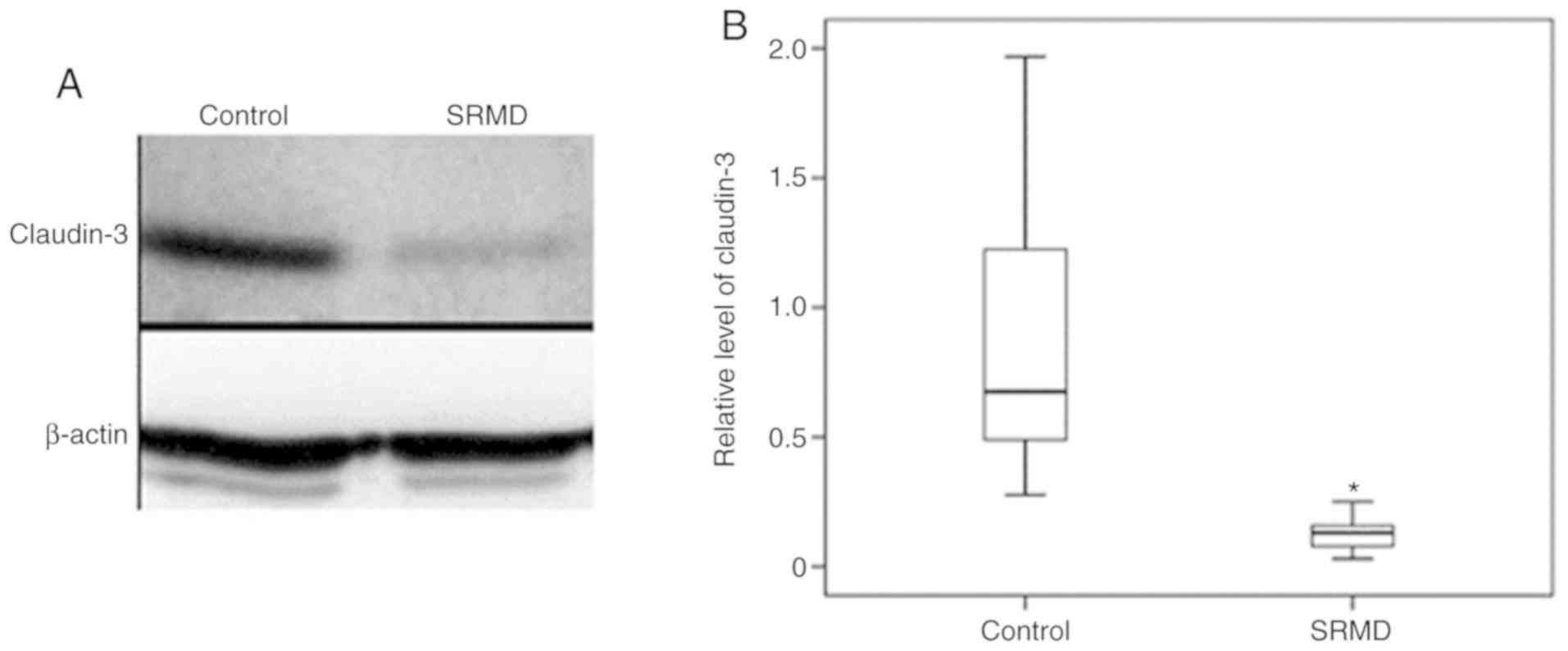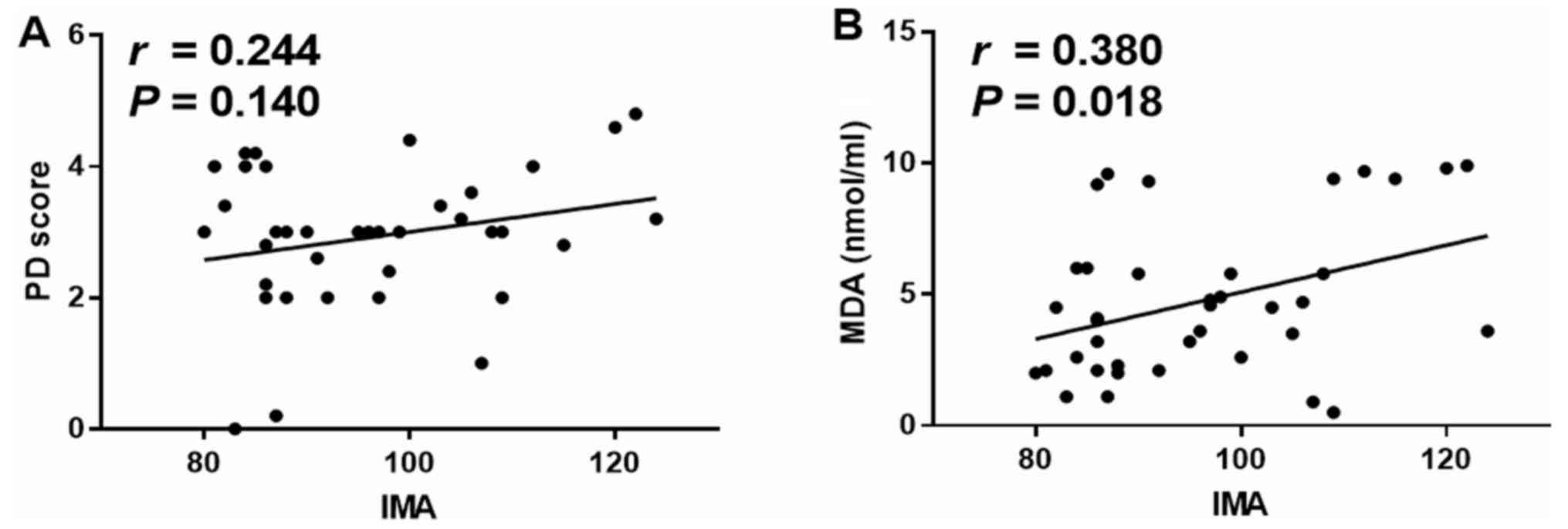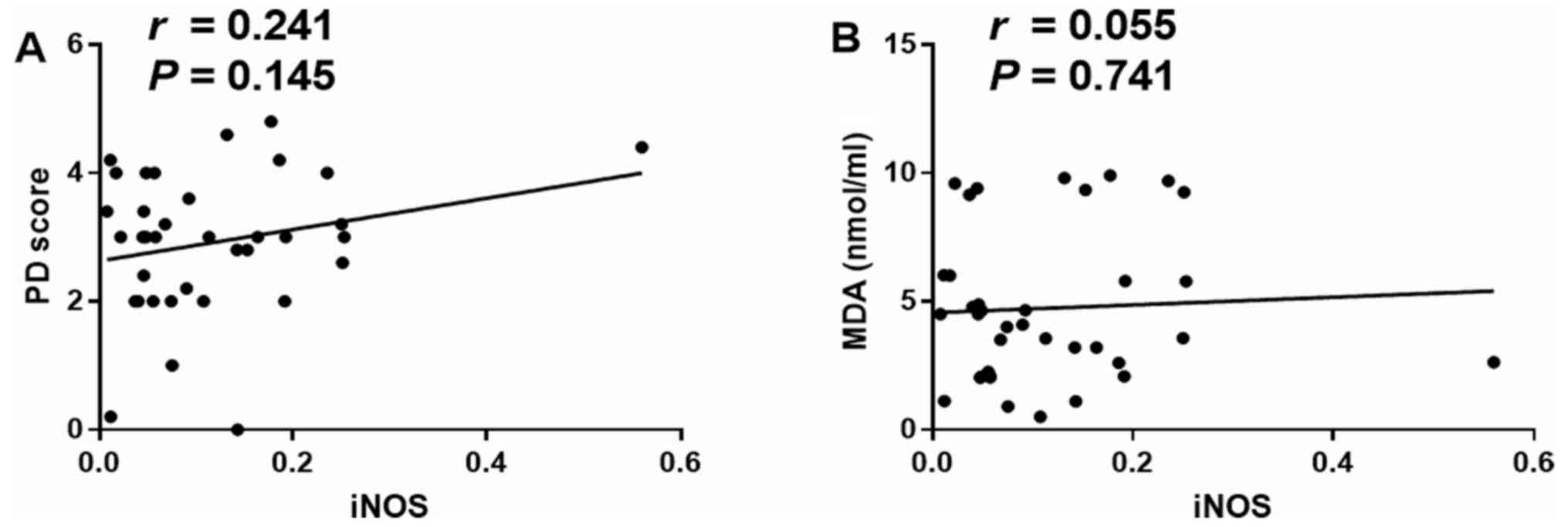|
1
|
Kantorova I, Svoboda P, Scheer P, Doubek
J, Rehorkova D, Bosakova H and Ochmann J: Stress ulcer prophylaxis
in critically ill patients: A randomized controlled trial.
Hepatogastroenterology. 51:757–761. 2004.PubMed/NCBI
|
|
2
|
Lin PC, Chang CH, Hsu PI, Tseng PL and
Huang YB: The efficacy and safety of proton pump inhibitors vs.
histamine-2 receptor antagonists for stress ulcer bleeding
prophylaxis among critical care patients: A meta-analysis. Crit
Care Med. 38:1197–1205. 2010.PubMed/NCBI View Article : Google Scholar
|
|
3
|
Chu YF, Jiang Y, Meng M, Jiang JJ, Zhang
JC, Ren HS and Wang CT: Incidence and risk factors of
gastrointestinal bleeding in mechanically ventilated patients.
World J Emerg Med. 1:32–36. 2010.PubMed/NCBI
|
|
4
|
Knaus WA, Draper EA, Wagner DP and
Zimmerman JE: APACHE II: A severity of disease classification
system. Crit Care Med. 13:818–829. 1985.PubMed/NCBI
|
|
5
|
Niewiński G, Starczewska M and Kański A:
Prognostic scoring systems for mortality in intensive care
units-the APACHE model. Anaesthesiol Intensive Ther. 46:46–49.
2014.PubMed/NCBI View Article : Google Scholar
|
|
6
|
Ali T and Harty RF: Stress-induced ulcer
bleeding in critically ill patients. Gastroenterol Clin North Am.
38:245–265. 2009.PubMed/NCBI View Article : Google Scholar
|
|
7
|
Preiser JC: Oxidative stress. JPEN J
Parenter Enteral Nutr. 36:147–154. 2012.PubMed/NCBI View Article : Google Scholar
|
|
8
|
Spirlandeli AL, Deminice R and Jordao AA:
Plasma malondialdehyde as biomarker of lipid peroxidation: Effects
of acute exercise. Int J Sports Med. 35:14–18. 2014.PubMed/NCBI View Article : Google Scholar
|
|
9
|
Kwiecień S, Brzozowski T and Konturek SJ:
Importance of aldehyde products of lipid peroxidation in the
formation of gastric lesions induced by aspirin,
ischemia-reperfusion and stress. Gastroenterol Polska. 9:273–280.
2002.
|
|
10
|
Matsuda T, Tao H, Goto M, Yamada H, Suzuki
M, Wu Y, Xiao N, He Q, Guo W, Cai Z, et al: Lipid
peroxidation-induced DNA adducts in human gastric mucosa.
Carcinogenesis. 34:121–127. 2013.PubMed/NCBI View Article : Google Scholar
|
|
11
|
Kwiecień S, Pawlik MW, Brzozowski T,
Pawlik WW and Konturek SJ: Reactive oxygen metabolite action in
experimental, stress model of gastric mucosa damage. Gastroenterol
Polska. 17:234–243. 2010.
|
|
12
|
Borderie D, Allanore Y, Meune C, Devaux
JY, Ekindjian OG and Kahan A: High ischemiamodifed albumin
concentration reflects oxidative stress but not myocardial
involvement in systemic sclerosis. Clin Chem. 50:2190–2193.
2004.PubMed/NCBI View Article : Google Scholar
|
|
13
|
Aydin O, Ellidag HY, Eren E, Kurtulus F,
Yaman A and Yilmaz N: Ischemia modified albumin is an indicator of
oxidative stress in multiple sclerosis. Biochem Med (Zagreb).
24:383–389. 2014.PubMed/NCBI View Article : Google Scholar
|
|
14
|
Gothe PR, Jose M, Pai VR, Harish S,
D'Souza J and Prabhu V: Investigation of the possibility of using
serum ischemia modified albumin (IMA) as a novel and early marker
of the extent of oxidative stress induced by various tobacco
products. J Clin Diagn Res. 9:ZC33–ZC35. 2015.PubMed/NCBI View Article : Google Scholar
|
|
15
|
Martin MJ, Jimenez MD and Motilva V: New
issues about nitric oxide and its effects on the gastrointestinal
tract. Curr Pharm Des. 7:881–908. 2001.PubMed/NCBI View Article : Google Scholar
|
|
16
|
Stanek A, Gadowska-Cicha A, Gawron K,
Wielkoszyński T, Adamek B, Cieślar G, Wiczkowski A and Sieroń A:
Role of nitric oxide in physiology and pathology of the
gastrointestinal tract. Mini Rev Med Chem. 8:1549–1560.
2008.PubMed/NCBI View Article : Google Scholar
|
|
17
|
Kobata A, Kotani T, Komatsu Y, Amagase K,
Kato S and Takeuchi K: Dual action of nitric oxide in the
pathogenesis of ischemia/reperfusion-induced mucosal injury in
mouse stomach. Digestion. 75:188–197. 2007.PubMed/NCBI View Article : Google Scholar
|
|
18
|
Tanaka A, Kunikata T, Mizoguchi H, Kato S
and Takeuchi K: Dual action of nitric oxide in pathogenesis of
indomethacin-induced small intestinal ulceration in rats. J Physiol
Pharmacol. 50:405–417. 1999.PubMed/NCBI
|
|
19
|
Whittle BJ, Laszlo F, Evans SM and Moncada
S: Induction of nitric oxide synthase and microvascular injury in
the rat jejunum provoked by indomethacin. Br J Pharmacol.
116:2286–2290. 1995.PubMed/NCBI View Article : Google Scholar
|
|
20
|
Wu J, Yang Y, Xun N, Zeng L, Li Z, Yang W,
Liang Y, Ma Z and Tang H: Osthole attenuates myocardial
ischemia/reperfusion injury in rats by inhibiting apoptosis and
inflammation. Am J Transl Res. 10:1109–1116. 2018.PubMed/NCBI
|
|
21
|
Zhu L, Wei T, Gao J, Chang X, He H, Luo F,
Zhou R, Ma C, Liu Y and Yan T: The cardioprotective effect of
salidroside against myocardial ischemia reperfusion injury in rats
by inhibiting apoptosis and inflammation. Apoptosis. 20:1433–1443.
2015.PubMed/NCBI View Article : Google Scholar
|
|
22
|
Patel RM, Myers LS, Kurundkar AR,
Maheshwari A, Nusrat A and Lin PW: Probiotic bacteria induce
maturation of intestinal claudin 3 expression and barrier function.
Am J Pathol. 180:626–635. 2012.PubMed/NCBI View Article : Google Scholar
|
|
23
|
Hashimoto K, Oshima T, Tomita T, Kim Y,
Matsumoto T, Joh T and Miwa H: Oxidative stress induces gastric
epithelial permeability through claudin-3. Biochem Biophys Res
Commun. 376:154–157. 2008.PubMed/NCBI View Article : Google Scholar
|
|
24
|
Masuda E, Kawano S, Nagano K, Tsuji S,
Takei Y, Hayashi N, Tsujii M, Oshita M, Michida T and Kobayashi I:
Role of endogenous endothelin in pathogenesis of ethanol-induced
gastric mucosal injury in rats. Am J Physiol. 265:G474–G481.
1993.PubMed/NCBI View Article : Google Scholar
|
|
25
|
Yagi K: A simple fluorometric assay for
lipoperoxide in blood plasma. Biochem Med. 15:212–216.
1976.PubMed/NCBI View Article : Google Scholar
|
|
26
|
Swann JW, Maunder CL, Roberts E,
McLauchlan G and Adamantos S: Prevalence and risk factors for
development of hemorrhagic gastro-intestinal disease in veterinary
intensive care units in the United Kingdom. J Vet Emerg Crit Care
(San Antonio). 26:419–427. 2016.PubMed/NCBI View Article : Google Scholar
|
|
27
|
Sbarouni E, Georgiadou P and Voudris V:
Ischemia modified albumin changes-review and clinical implications.
Clin Chem Lab Med. 49:177–184. 2011.PubMed/NCBI View Article : Google Scholar
|
|
28
|
Sharma R, Gaze DC, Pellerin D, Mehta RL,
Gregson H, Streather CP, Collinson PO and Brecker SJ:
Ischemia-modified albumin predicts mortality in ESRD. Am J Kidney
Dis. 47:493–502. 2006.PubMed/NCBI View Article : Google Scholar
|
|
29
|
Apple FS, Quist HE, Otto AP, Mathews WE
and Murakami MM: Release characteristics of cardiac biomarkers and
ischemia-modified albumin as measured by the albumin cobalt-binding
test after a marathon race. Clin Chem. 48:1097–1100.
2002.PubMed/NCBI
|
|
30
|
Lorente L, Martín MM, Abreu-Gonzalez P,
Domínguez-Rodríguez A, Labarta L, Díaz C, Solé-Violán J, Ferreres
J, Borreguero-León JM, Jiménez A and Morera-Fumero A: Prognostic
value of malondialdehyde serum levels in severe sepsis: A
multicenter study. PLoS One. 8(e53741)2013.PubMed/NCBI View Article : Google Scholar
|
|
31
|
Satoh M, Kotani K, Gugliucci A, Horie H,
Caccavello R and Takeuchi M: Correlation of ischemia-modified
albumin with SOFA and APACHE II scores in preoperative patients
with colorectal cancer. ScientificWorldJournal.
2014(959075)2014.PubMed/NCBI View Article : Google Scholar
|
|
32
|
Kotani T, Kobata A, Nakamura E, Amagase K
and Takeuchi K: Roles of cyclooxygenase-2 and prostacyclin/IP
receptors in mucosal defense against ischemia/reperfusion injury in
mouse stomach. J Pharmacol Exp Ther. 316:547–555. 2006.PubMed/NCBI View Article : Google Scholar
|
|
33
|
Naito Y, Yoshikawa T, Matsuyama K, Yagi N,
Arai M, Nakamura Y, Kaneko T, Yoshida N and Kondo M: Neutrophils,
lipid peroxidation, and nitric oxide in gastric reperfusion injury
in rats. Free Radic Biol Med. 24:494–502. 1998.PubMed/NCBI View Article : Google Scholar
|
|
34
|
Lopez-Belmonte J, Whittle BJ and Moncada
S: The actions of nitric oxide donors in the prevention or
induction of injury to the rat gastric mucosa. Br J Pharmacol.
108:73–78. 1993.PubMed/NCBI View Article : Google Scholar
|
|
35
|
Zhu T, Yao Q, Wang W, Yao H and Chao J:
INOS induces vascular endothelial cell migration and apoptosis via
autophagy in ischemia/reperfusion injury. Cell Physiol Biochem.
38:1575–1588. 2016.PubMed/NCBI View Article : Google Scholar
|
|
36
|
Okuda M, Lee HC, Chance B and Kumar C:
Role of extracellular Ca2+ in ischemia-reperfusion injury in the
isolated perfused rat liver. Circ Shock. 37:209–219.
1992.PubMed/NCBI
|
|
37
|
Dijkstra G, Moshage H, van Dullemen HM, de
Jager-Krikken A, Tiebosch AT, Kleibeuker JH, Jansen PL and van Goor
H: Expression of nitric oxide synthases and formation of
nitrotyrosine and reactive oxygen species in inflammatory bowel
disease. J Pathol. 186:416–421. 1998.PubMed/NCBI View Article : Google Scholar
|
|
38
|
Bae YS, Kang SW, Seo MS, Baines IC, Tekle
E, Chock PB and Rhee SG: Epidermal growth factor (EGF)-induced
generation of hydrogen peroxide. Role in EGF receptor-mediated
tyrosine phosphorylation. J Biol Chem. 272:217–221. 1997.PubMed/NCBI
|
|
39
|
Bai XC, Lu D, Liu AL, Zhang ZM, Li XM, Zou
ZP, Zeng WS, Cheng BL and Luo SQ: Reactive oxygen species
stimulates receptor activator of NF-kappaB ligand expression in
osteoblast. J Biol Chem. 280:17497–17506. 2005.PubMed/NCBI View Article : Google Scholar
|
|
40
|
D'Souza T, Agarwal R and Morin PJ:
Phosphorylation of claudin-3 at threonine 192 by cAMP-dependent
protein kinase regulates tight junction barrier function in ovarian
cancer cells. J Biol Chem. 280:26233–26240. 2005.PubMed/NCBI View Article : Google Scholar
|
|
41
|
De R, Mazumder S, Sarkar S, Debsharma S,
Siddiqui AA, Saha SJ, Banerjee C, Nag S, Saha D and Bandyopadhyay
U: Acute mental stress induces mitochondrial bioenergetic crisis
and hyper-fission along with aberrant mitophagy in the gut mucosa
in rodent model of stress-related mucosal disease. Free Radic Biol
Med. 113:424–438. 2017.PubMed/NCBI View Article : Google Scholar
|





















